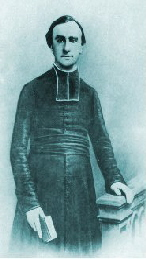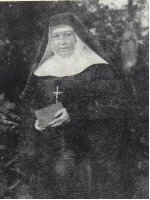 Throughout history God always hears the cry of those who suffer most when times are changing. The Industrial Revolution which swept through Europe in the middle of the nineteenth century brought wealth to few and misery to the many who helped to produce it.
Throughout history God always hears the cry of those who suffer most when times are changing. The Industrial Revolution which swept through Europe in the middle of the nineteenth century brought wealth to few and misery to the many who helped to produce it.
The original roots of our congregation were planted in a seedy quartier of Paris in October 1866. At that time, thousands of young workers flocked to the city in search of employment, leaving behind the poverty of rural France which local wars and successive bad harvests had produced.
Among those chosen by God to heed the cry of this anonymous workforce was Peter Victor Braun who came from the small military town of St. Avold. A few years later he moved to “downtown” Paris. Here his priestly zeal found an outlet in a new mission to the migrant workers, many of whom came from his home province of Alsace Lorraine. A regular confessor in the famous church of Our Lady of Victories, Father Braun came to know for himself the terrible plight of the young female workers when they found themselves abandoned having become suddenly unemployed or unemployable.
With the help of a small band of local women he set up a hostel catering for their basic needs. Here they were sure to find a friendly face. He also came across young mothers who found themselves hopelessly lost in a sea of debt, having to care single-handedly for their young children. For them he started an orphanage so that they could carry on earning. Those who fell ill, both men and women had no hope of receiving any form of medical attention.
Father Braun put in place a scheme to help them also. Some of his new helpers would tend the sick in their slum dwellings. Home-based care began a long time ago….
On October 1866 Father Braun began to discern the workings of the Holy Spirit at this period in his life. Though he later described himself as a reluctant founder, he became increasingly aware that God was calling him to do something new in the church of his time. And so he named his first three dedicated helpers as the core group of what would become a new congregation of women religious in the church. Because of his deep devotion to the Sacred Heart of Jesus he named them.
Servants of the Sacred Heart
The sudden outbreak of the Franco-Prussian war in the summer of 1870 brought about an unforeseen change of direction for the Servants of the Sacred Heart. Rumours of the setting up of the Paris Commune forced a group of sisters to flee to safety in England. Shortly after their safe arrival a larger group followed together with their traumatised founder just back from the war-front. The great Cardinal Manning welcomed the weary travellers and offered them a refuge in a house close to the newly - built church in Stratford. Soon the sisters were replicating in London’s east end similar provision for working-class families as those they had so recently set up in Paris.
By the end of the century the English branch of the Servants of the Sacred Heart had increased in number and their services had spread to some Welsh and Scottish mining towns where the nursing sisters set up clinics and cottage hospitals. Other sisters taught in parish schools while the whole community undertook parish visitation at week-ends.
 With the approach of the new century new structures were necessary if the mission of the congregation was to develop in accordance with the needs of the Catholic population in the UK. There was an increasing divergence of vision between the administrations in London and Paris. Then in 1902, on the advice of Cardinal Vaughan of Westminster, most of the sisters (117 in all) of the English province of the Servants of the Sacred Heart became a new and separate congregation under the wise guidance of Sister WinifrideTyrrell. For many years Sister Winifride had been the principal of Guardian Angels’ School in London’s Mile End.
With the approach of the new century new structures were necessary if the mission of the congregation was to develop in accordance with the needs of the Catholic population in the UK. There was an increasing divergence of vision between the administrations in London and Paris. Then in 1902, on the advice of Cardinal Vaughan of Westminster, most of the sisters (117 in all) of the English province of the Servants of the Sacred Heart became a new and separate congregation under the wise guidance of Sister WinifrideTyrrell. For many years Sister Winifride had been the principal of Guardian Angels’ School in London’s Mile End.
Today the three congregations (centred in Chigwell, Versailles and Vienna) have come together in a new and special way under the banner of The Victor Braun Federation, which has Papal status.
May the brightness of our witness to the vision of Father Braun enlighten our own lives and the lives of those we touch in our service of love as we endeavour to live out our call, the call of Christ always bearing in our life and living Father Braun’s lasting testament to us.
There are two things in life . . . Jesus Christ and the poorest of God’s people


